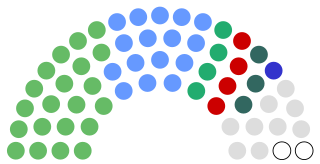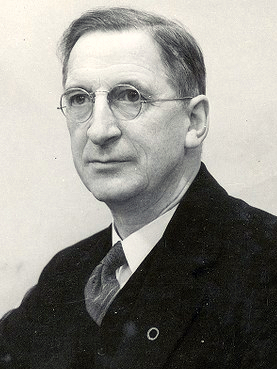Related Research Articles

The Oireachtas, sometimes referred to as Oireachtas Éireann, is the bicameral parliament of Ireland. The Oireachtas consists of:

The Constitution of the Irish Free State was adopted by Act of Dáil Éireann sitting as a constituent assembly on 25 October 1922. In accordance with Article 83 of the Constitution, the Irish Free State Constitution Act 1922 of the British Parliament, which came into effect upon receiving the royal assent on 5 December 1922, provided that the Constitution would come into effect upon the issue of a Royal Proclamation, which was done on 6 December 1922. In 1937 the Constitution of the Irish Free State was replaced by the modern Constitution of Ireland following a referendum.
The Government of the 8th Dáil or the 7th Executive Council was the Executive Council of the Irish Free State formed after the general election held on 24 January 1933. It was led by Fianna Fáil leader Éamon de Valera as President of the Executive Council, who had first taken office in the Irish Free State after the 1932 general election. De Valera had previously served as President of Dáil Éireann, or President of the Republic, from April 1919 to January 1922 during the revolutionary period of the Irish Republic.
There were two Governments of the 6th Dáil, which was elected at the September 1927 general election held on 15 September 1927. The 4th Executive Council and the 5th Executive Council were both minority governments of Cumann na nGaedheal led by W. T. Cosgrave as President of the Executive Council.

The 1937 Irish general election to the 9th Dáil was held on Thursday, 1 July, following the dissolution of the 8th Dáil on 14 June by Ceann Comhairle Frank Fahy on the direction of the Executive Council. The general election took place in 34 parliamentary constituencies throughout the Irish Free State for 138 seats in Dáil Éireann. The number of seats in the Dáil was reduced by 15, from 153 to 138 seats, under the Electoral Act 1935.
The Fourth Amendment of the Constitution Act 1972 is an amendment to the Constitution of Ireland which lowered the voting age for all national elections and referendums in the state from twenty-one to eighteen years of age. It was approved by referendum on 7 December 1972 and signed into law on 5 January 1973.
An ordinary referendum in Ireland is a referendum on a bill other than a bill to amend the Constitution. The Constitution prescribes the process in Articles 27 and 47. Whereas a constitutional referendum is mandatory for a constitutional amendment bill, an ordinary referendum occurs only if the bill "contains a proposal of such national importance that the will of the people thereon ought to be ascertained". This is decided at the discretion of the President, after a petition by Oireachtas members including a majority of Senators. No such petition has ever been presented, and thus no ordinary referendum has ever been held.

The Oireachtas of the Irish Free State was the legislature of the Irish Free State from 1922 until 1937. It was established by the 1922 Constitution of Ireland which was based from the Anglo-Irish Treaty. It was the first independent Irish Parliament officially recognised outside Ireland since the historic Parliament of Ireland which was abolished with the Acts of Union 1800.

The current Constitution of Ireland came into effect on 29 December 1937, repealing and replacing the Constitution of the Irish Free State, having been approved in a national plebiscite on 1 July 1937 with the support of 56.5% of voters in the then Irish Free State. The Constitution was closely associated with Éamon de Valera, the President of the Executive Council of the Irish Free State at the time of its approval.
The Third Amendment of the Constitution Bill 1958 was a proposal to amend the Constitution of Ireland to alter the electoral system from proportional representation under the single transferable vote (PR-STV) to first-past-the-post (FPTP). The proposal was rejected in a referendum held on 17 June 1959. This was the same date as the presidential election in which Taoiseach Éamon de Valera was elected as president.
The Third Amendment of the Constitution Bill 1968 was a bill to amend the Constitution of Ireland to change the criteria for redistribution of constituencies for elections to Dáil Éireann, the lower house of the Oireachtas. The proposal was rejected in a referendum held on 16 October 1968.
The Tenth Amendment of the Constitution Bill 1986 was a proposed amendment to the Constitution of Ireland to remove the prohibition on divorce. The proposal was rejected in a referendum on 26 June 1986. It was the first of two referendums held in Ireland on the question of divorce; the Fifteenth Amendment in 1995 allowed for divorce under specified conditions.

The Emergency Powers Act 1939 (EPA) was an Act of the Oireachtas enacted on 3 September 1939, after an official state of emergency had been declared on 2 September 1939 in response to the outbreak of the Second World War. The Act empowered the government to:
make provisions for securing the public safety and the preservation of the state in time of war and, in particular, to make provision for the maintenance of public order and for the provision and control of supplies and services essential to the life of the community, and to provide for divers and other matters connected with the matters aforesaid.
The 1934 Seanad was the part of the Seanad of the Irish Free State (1922–1936) in office after the 1934 Seanad election until its abolition in 1936. Elections to the Seanad, the Senate of the Oireachtas took place on a triennial basis, with senators elected in stages. The 1934 Seanad included members elected at the 1925, 1928, 1931 and 1934 Seanad elections. It sat as a second chamber to the 8th Dáil elected at the 1933 general election.
The Marriage Act 2015 is an act of the Oireachtas which provides for same-sex marriage in Ireland. The act gives legislative effect in statute law to the Thirty-fourth Amendment of the Constitution of Ireland, which mandates such provision. It was introduced on 15 September 2015 and signed into law on 29 October 2015, and commenced on 16 November 2015.
The Constitution Act 1933 was an Act of the Oireachtas of the Irish Free State amending the Constitution of the Irish Free State and the Constitution of the Irish Free State Act 1922. It removed the Oath of Allegiance required of members of the Oireachtas (legislature) and of non-Oireachtas extern ministers.
The Constitution Act 1936 was an Act of the Oireachtas of the Irish Free State amending the Constitution of the Irish Free State which had been adopted in 1922. It abolished the two university constituencies in Dáil Éireann.
The Constitution Act 1930 was an Act of the Oireachtas of the Irish Free State amending the Constitution of the Irish Free State. It amended Article 35 of the constitution.
The Constitution Act 1929 was an Act amending the Constitution of the Irish Free State. It amended Article 34 of the constitution regarding the filling of casual vacancies in Seanad Éireann.
The Thirty-eighth Amendment of the Constitution of Ireland is an amendment to the Constitution of Ireland which altered the provisions regulating divorce. It removed the constitutional requirement for a defined period of separation before a Court may grant a dissolution of marriage, and eased restrictions on the recognition of foreign divorces. The amendment was effected by an act of the Oireachtas, the Thirty-eighth Amendment of the Constitution Act 2019.
References
Sources
- "Constitution (Amendment No. 24) Act 1936". electronic Irish Statute Book. Retrieved 4 October 2018.
- "Constitution (Amendment No. 24) Act 1936 : Dáil debates". Bills and Acts. Oireachtas. 22 March 1934. Retrieved 4 October 2018.
Citations
- ↑ "Constitution (Amendment No. 24) Bill, 1934 — Second Stage (Resumed)". Seanad Éireann debate. 1 June 1934. Retrieved 4 October 2018.
- ↑ "Constitution (Amendment No. 24) Bill, 1934 — Motion Under Article 38A of the Constitution". Dáil Éireann debate. 12 December 1935.
- ↑ "Constitution (Amendment No. 24) Bill, 1935 — Motion by Senator Douglas (Resumed)". Seanad Éireann debate. 16 January 1936.
- ↑ "Constitution (Amendment No. 24) Bill, 1934 — Motion of Enactment". Dáil Éireann debate. 28 May 1936. Retrieved 4 October 2018.
- ↑ Ruane, Bláthna (June 2013). "The Proposed Abolition of the Seanad and the Implications for Judicial Independence" (PDF). Bar Review. Dublin: Law Library.
- ↑ "Statute Law Revision Act 2016". Irish Statute Book. 26 December 2016. Retrieved 27 March 2020.